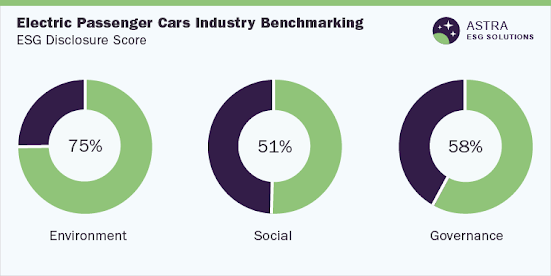Sustainability Assessment, Policies & Regulations, ESG Issues, Infrastructure Developments, Company Profiles, Benchmarking, SWOT, Company ESG Disclosure Scores
The average ESG disclosure score for the electric passenger cars industry is between 60% and 70%. Our proprietary ESG scoring framework analyzed 65 parameters across the environment, social, and corporate governance, as represented in the methodology section of this document. General Motors (GM), Mitsubishi Motor Corporation (MMC), and seven other market leaders were part of our research. Seven out of nine companies we researched scored above the average industry score. However, two market leaders need to focus more on ESG reporting and transparency as they scored well below 50%.
For More Details: https://astra.grandviewresearch.com/electric-passenger-cars-industry-esg-outlook
Environmental insights
In recent years, Electric Vehicles (EVs) have become more popular, which has been good news for the environment. Switching to EVs helps in avoiding the exhaustion of finite resources and also provides another way to reduce carbon footprint because these vehicles have no tailpipe emissions, which is a direct contributor to global warming. Companies in the EV market have institutionalized stringent targets to fight climate change and global warming. Most of the players like Nissan motors have programs for managing waste and reducing water consumption through the 3R (Reduce, Reuse, Recycle) and Circular Economy models.
Social insights
Social metrics assess the risk to a company from community and human capital, which include employees & stakeholders and their relationship with them. Employees’ and safety parameters covering OHSAS certifications, and injury rates, alongside employee training & development, employee engagement programs, privacy, supply chain transparency, and human rights are majorly included in this category. With a social disclosure score of 67%, Toyota Motor Corporation ranks the highest. Most of the companies, including the top three, have separate supplier CSR guidelines or human rights policies aligned with the United Nations Guiding Principles on Business and Human rights, except Volkswagen AG, which lacks a separate supplier code of conduct on human rights or any such supply chain policy.
Governance insights
Corporate governance practices are core to an organization as understanding opportunities and risks in governance is critical for decision-making. Governance is one of ESG’s core components and assesses the purpose of a corporation, the role of directors, the make-up of directors, gender diversity, equity, and compensation of boards. Independent directors on the board play a crucial role in improving governance standards and corporate credibility. In 2020, GM had the highest representation of independent directors on board with over 90% independent directors on its board. Furthermore, in terms of diversity in the board, GM had the highest percentage of females on board, with more than 50% female members on board.
Request for Free Demo: https://astra.grandviewresearch.com/electric-passenger-cars-industry-esg-outlook/request/rs1

